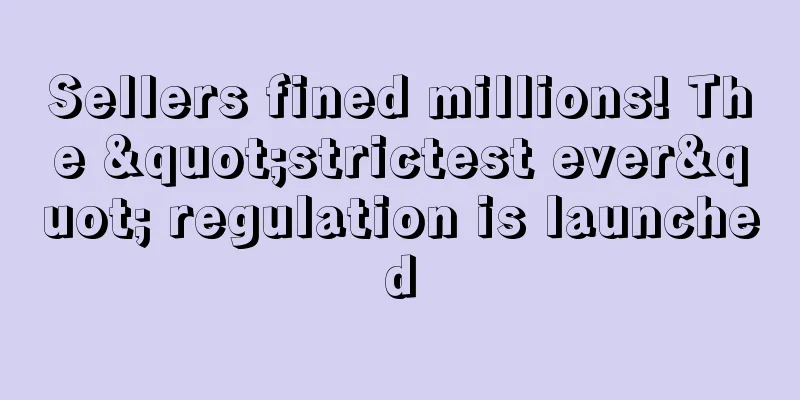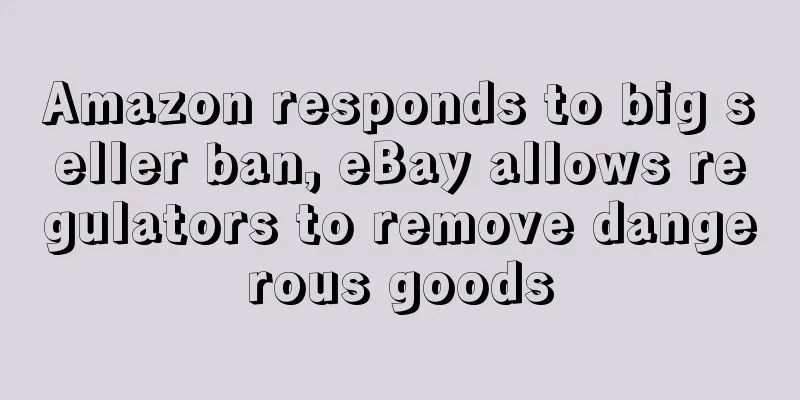Sellers fined millions! The "strictest ever" regulation is launched

|
The tax issues of cross-border e-commerce cannot be ignored!
Tax law issues are an important part of cross-border e-commerce. VAT is becoming increasingly strict, and the so-called "strictest in history" Golden Tax Phase IV is also here. The trend of tax compliance in cross-border e-commerce is irreversible. However, many cross-border companies have not deeply understood and achieved tax compliance, which has laid hidden dangers for their operations. Almost every once in a while, news about cross-border people being audited by the tax bureau will be exposed.
Compliance export model, tax law "literacy" is imminent. Next, Mr. Yang Xiaoqiang will provide a detailed interpretation of cross-border tax law issues.
What impact will the “strictest in history” Golden Tax Phase IV have on cross-border people?
Professor Yang Xiaoqiang is a professor of tax law at the Law School of Sun Yat-sen University, a doctoral supervisor, the director of the Law and Economics Research Center of Sun Yat-sen University , and a global tax consultant of Eurotax. He has studied tax law or served as a visiting professor at the Law School of Cardiff University in the UK, the National Law University of Jodhpur in India, the International Bureau of Fiscal Documentation (IBFD), the Max Planck Institute for Tax Law in Germany, the Law School of National Taiwan University, and the Law School of the University of Padova in Italy. He participated in the legislative research of the Value Added Tax Law, the Tariff Law, the Customs Law, and the Hainan Free Trade Port Law .
Regarding the recent high-profile Golden Tax Phase IV, Mr. Yang said that the reason why Golden Tax Phase IV is known as the "strictest in history" is that its most powerful, direct, fastest and most effective move is to manage taxes by numbers . Golden Tax Phase IV will bring the following important changes:
First, social security and non-tax businesses will be included in the regulatory scope to achieve comprehensive monitoring of the business; The second is to build a sharing channel to achieve information sharing among various departments (bank information is not yet linked), and to achieve unified supervision of the identity information of relevant personnel of the enterprise, the tax and fee declaration status of the enterprise, the registration information of the enterprise, and the data of the enterprise issuing and receiving invoices; Third, invoice supervision will be expanded from taxpayers in the pilot program of electronic special invoices to all taxpayers, and from electronic special invoices to all invoice data; Fourth, the scope of risk prevention and control has expanded from value-added tax to multiple taxes such as income tax, consumption tax, vehicle purchase tax, garbage disposal fees, disability insurance premiums, water conservancy funds and other fees, as well as the comprehensive services and supervision of multiple social insurances such as pension, medical care, industry and commerce.
With the launch of the fourth phase of the Golden Tax System, tax authorities, government agencies, the People's Bank of China, rural commercial banks and other institutions can share data, provided that statutory conditions are met. The tax bureau can crack down on tax evasion by monitoring bank accounts. Cash transactions exceeding 50,000, public-to-public transfers exceeding 2 million, excessive transfers from private accounts, small-scale but huge turnover, abnormal transfers in and out, funds flows unrelated to operations, frequent transfers between public and private accounts, frequent account openings and closings, and large transactions in restricted accounts will be the focus of tax inspections . In cross-border business, agricultural products, electronic technology products, and precious metal products such as silver are areas with high tax risks . Specifically:
The characteristics of self-issuance and self-deduction of agricultural product purchase invoices, coupled with the country's omissions in the invoice management system, make the agricultural product industry an industry with a high incidence of false invoice cases.
Electronic technology products, including mobile phone software products, are difficult to accurately judge because of their value and function. This leads to problems such as under-reporting imports, over-reporting exports, and arbitrary changes in product names during import and export, which results in frequent tax fraud. In addition, electronic technology products are also easily combined with precious metal products, using the "technological attributes" of electronic technology products to cover up the "smuggling" attributes of precious metal exports, while also achieving the purpose of defrauding export tax rebates and grabbing high tax benefits.
With the popularization and application of big data technology, the Golden Tax Phase IV will monitor taxpayers' illegal behaviors in a timely manner by comprehensively collecting key enterprise data. The probability of enterprise-related tax violations going undetected will become smaller and smaller. Enterprises will gradually become transparent, and tax audits will be stricter, more accurate, and more comprehensive.
Many sellers have been fined for the Golden Tax Phase IV issue . According to data, at the end of last year, a supply chain management company in Shenzhen concealed 17.4 million yuan in income by setting up shell companies and opening bank accounts in Hong Kong and collecting business payments from overseas institutions. In the end, the company was required to pay a total of 3.21 million yuan in value-added tax and income tax from January 2014 to March 2021, and a total of 6.43 million yuan in taxes and fines. The company not only concealed income and evaded taxes through Hong Kong companies, but also used personal accounts to pay bonuses and labor remuneration to employees without withholding personal income tax. In the end, the company was required to pay 692,000 yuan in personal income tax that should have been withheld from January 2014 to March 2021, and was fined 1.5 times the amount of underpaid taxes, totaling 1.73 million yuan in taxes and fines.
How do cross-border sellers ensure tax compliance ?
In fact, tax compliance issues have always existed. However, due to insufficient knowledge, cross-border sellers often make many financial and tax misunderstandings , such as not fully understanding local tax laws and policies and tax incentives in various countries , and their financial management systems do not comply with local systems . How can cross-border sellers do a good job in financial and tax compliance ? Mr. Yang gave the following 6 suggestions:
1. Fully understand and appropriately apply the state’s preferential tax policies 1. E-commerce export enterprises shall register in the comprehensive pilot zone and handle export declaration at the customs of the place of registration to apply the "tax exemption without invoice" policy ; 2. Make tax returns in accordance with the law, accurately calculate the total income, and fully apply the corporate income tax preferential policies ;
(II) Conduct self-examination and self-correction, and focus on daily tax compliance management 1. Complete tax self-examination and correct tax non-compliance behaviors ; 2. Carry out tax registration in accordance with the law ; 3. Pay attention to the retention of daily transaction information ; 4. Use public accounts to conduct transactions, confirm income truthfully, and complete tax returns on time ;
(III) Make full use of RCEP policies for reasonable tax planning RCEP has made provisions in promoting paperless trade and temporary exemption of tariffs , creating a more convenient online business environment, and for the first time added e-commerce related rules. Cross-border e-commerce can make full use of RCEP's relevant tax preferential policies and e-commerce rules, and make reasonable input tax planning.
(IV) Determining the collection and payment obligations of cross-border e-commerce platforms European countries have the right to require a well-known cross-border e-commerce company to collect VAT on its inbound goods. This requirement is a legal means adopted by various countries to prevent the hidden tax source loss problem in the previous cross-border small-scale scattered e-commerce business. It can be used as a reference in domestic tax collection and management, requiring cross-border e-commerce platforms to fulfill their obligation to collect and pay VAT on behalf of others.
(V) Pay attention to the compliance of capital flows of cross-border e-commerce enterprises Capital flow is closely related to tax compliance and is also the focus of tax compliance. Cross-border e-commerce companies can consider choosing compliant third-party payment platforms and foreign exchange settlement channels for capital collection and payment. Illegal foreign exchange is not feasible. At the same time, cross-border e-commerce companies should declare truthfully when declaring taxes.
(VI) Improve the data reporting obligations of cross-border e-commerce platforms If cross-border e-commerce platforms fulfill their data reporting obligations, tax authorities can collect data on the import and export of goods and the inflow and outflow of funds by cross-border e-commerce enterprises, and conduct tax assessments through data collection and analysis, which can effectively strengthen the tax collection and management of cross-border e-commerce and truly achieve " taxation by numbers " . Of course, the specific scope and content of tax data reported by cross-border e-commerce platforms, reporting procedures and tax collection and management measures still need to be clarified and improved by relevant laws, regulations or normative documents.
On April 11, at the 2023 Sixth Cross-border E-commerce Internet Marketing Conference hosted by Ennet, Mr. Yang Xiaoqiang will give a more detailed interpretation of "Tax Issues in Cross-border E-commerce". Please scan the QR code below or click "Read Original Text" to sign up for the conference! |
Recommend
Nearly 43,000 tables recalled, Costco furniture in Canada poses hidden dangers
At present, countries have stepped up their contr...
Amazon will update the dimensional attributes of home products, and Instagram will launch a new feature of virtual makeup shopping
Amazon will update the dimensions of home product...
Many items sold out at Russian specialty stores
As Western countries impose sanctions on Russia f...
What is the Japanese Giant Panda Overseas Warehouse? Japanese Giant Panda Overseas Warehouse Review, Features
Giant Panda Overseas Warehouse was established in ...
What is Nouyo Supply Chain (Shanghai) Co., Ltd.? Nouyo Supply Chain (Shanghai) Co., Ltd. Review, Features
Nouyu Supply Chain (Shanghai) Co., Ltd. is a supp...
What is Circus? Circus Review, Features
Circus is a multicultural, fully integrated digit...
Market share 13.2%! TikTok stores are going crazy in this market
TikTok Shop is expected to capture 13.2% of South...
What is BeTree E-commerce Academy (Weishu Education)? BeTree E-commerce Academy (Weishu Education) Review, Features
BeTree E-commerce Academy (Shenzhen BeTree Educat...
Google launches the “Shops” feature. Will it squeeze the space for small and medium-sized sellers?
According to foreign media reports, Google recent...
What is TrafficStars? TrafficStars Review, Features
TrafficStars focuses on affiliate marketing advert...
What is windshop? windshop Review, Features
Windshop is a software that can track shipments se...
What is Haibi e-commerce agency operation (Fuzhou Haibi Technology Co., Ltd.)? Haibi e-commerce agency operation (Fuzhou Haibi Technology Co., Ltd.) Review, Features
Fuzhou Hibi Technology Co., Ltd. was established ...
Search volume for handmade furniture surges 23 times! Etsy reveals the latest consumer trends in the home furnishing category
A few days ago, Etsy officially released the late...
Amazon packages worth over one million were stolen, 3C sellers: Scared!
Recently, there have been frequent news reports a...
The new AI darling of cross-border sellers is here! You can create a marketing video for just a few yuan
The era of artificial intelligence is acceleratin...









